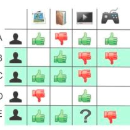As data privacy and security attract increasing attention, Federated Recommender System (FRS) offers a solution that strikes a balance between providing high-quality recommendations and preserving user privacy. However, the presence of statistical heterogeneity in FRS, commonly observed due to personalized decision-making patterns, can pose challenges. To address this issue and maximize the benefit of collaborative filtering (CF) in FRS, it is intuitive to consider clustering clients (users) as well as items into different groups and learning group-specific models. Existing methods either resort to client clustering via user representations-risking privacy leakage, or employ classical clustering strategies on item embeddings or gradients, which we found are plagued by the curse of dimensionality. In this paper, we delve into the inefficiencies of the K-Means method in client grouping, attributing failures due to the high dimensionality as well as data sparsity occurring in FRS, and propose CoFedRec, a novel Co-clustering Federated Recommendation mechanism, to address clients heterogeneity and enhance the collaborative filtering within the federated framework. Specifically, the server initially formulates an item membership from the client-provided item networks. Subsequently, clients are grouped regarding a specific item category picked from the item membership during each communication round, resulting in an intelligently aggregated group model. Meanwhile, to comprehensively capture the global inter-relationships among items, we incorporate an additional supervised contrastive learning term based on the server-side generated item membership into the local training phase for each client. Extensive experiments on four datasets are provided, which verify the effectiveness of the proposed CoFedRec.
翻译:暂无翻译




